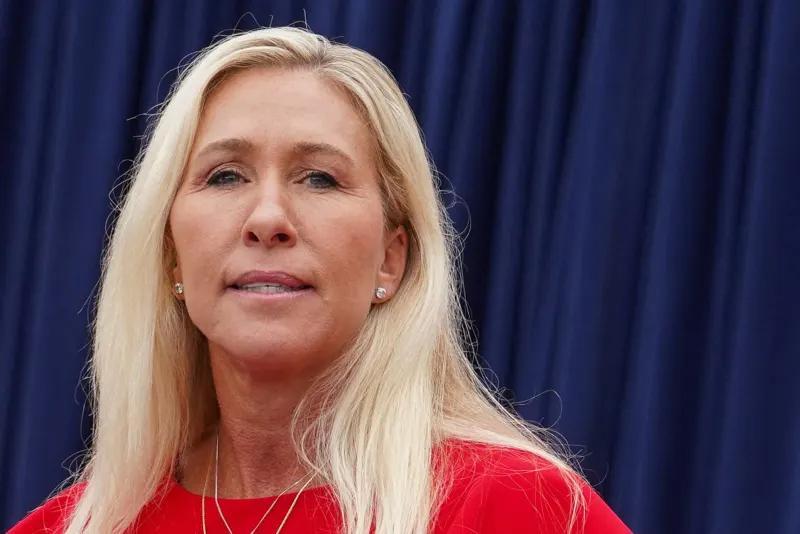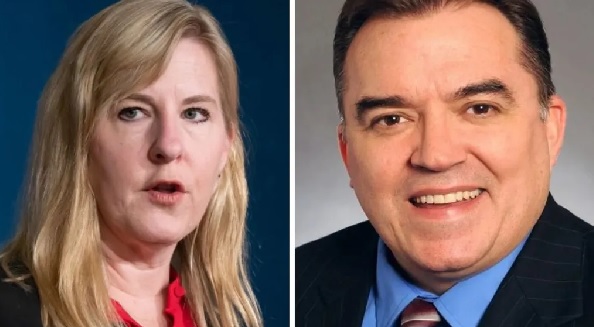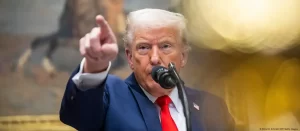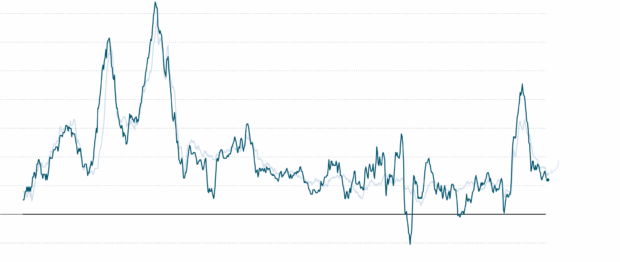
U.S. Representative Marjorie Taylor Greene (R-GA) is once again under scrutiny—this time for a potential violation of House ethics rules linked to her financial ties to Tesla. Greene, a vocal supporter of former President Donald Trump, recently called on the FBI and the Department of Justice (DOJ) to investigate protests against Tesla. However, her demands have sparked concerns about a conflict of interest, as she is a Tesla shareholder.
Greene’s Tesla Stock Purchases Raise Questions
According to Forbes, Greene has made significant investments in Tesla, buying hundreds of thousands of dollars’ worth of shares over the past year. Notably, these purchases ramped up after Elon Musk contributed to Trump’s re-election campaign. In addition, five of her Tesla stock purchases came after Trump appointed Musk to lead the Department of Government Efficiency, with her most recent transaction occurring on March 7.
House Ethics Rules and Potential Violations
The House ethics rules explicitly state that members “may not receive compensation and may not permit compensation to accrue to the beneficial interest of such individual from any source, the receipt of which would occur by virtue of influence improperly exerted from the position of such individual in Congress.”
In simpler terms, if Greene’s call for an FBI investigation into the protests helped Tesla by boosting its stock prices, she would be gaining financially from her congressional influence.
Legal Experts Weigh In
Brett Kappel, an attorney specializing in campaign finance, highlighted the serious ethical implications of Greene’s actions. He explained that House rules strictly prohibit members from taking any official action that benefits their financial interests.
“Calling for an FBI probe into protests that could directly impact Tesla’s stock value raises serious ethical questions,” Kappel stated.
What’s Next for Greene?
As the controversy unfolds, political analysts speculate whether this potential ethics violation could lead to an official investigation into Greene’s conduct. With political corruption and financial conflicts becoming a major concern among voters, this case serves as another example of how government officials may exploit their power for personal gain.
About the author
Italy Appoints World Cup Winner Gennaro Gattuso as Head Coach
On June 15, 2025, the Italian Football Federation (FIGC) confirmed Gennaro Gattuso as the new head coach of the Italy national team, succeeding Luciano Spalletti, who resigned after a 3-0 loss to Norway. Gattuso signed an initial one-year contract aimed at guiding Italy through the remainder of the 2026 World Cup qualifying campaign, with critical fixtures against Estonia (Sept 5) and Israel. 1. A Symbol of Italian Football The 47-year-old Gattuso is a revered figure in Italian football—capped 73 times, part of the 2006 World Cup-winning squad, and remembered for his fiery leadership on the pitch. FIGC President Gabriele Gravina echoed this sentiment: “The Azzurra jersey is like a second skin for him”, praising his passion, professionalism, and suitability to lead Italy forward. 2. Coaching Track Record Gattuso brings varied managerial experience, having led clubs such as AC Milan, Napoli (winning the […]
Ahmad June 15, 2025
Mass “No Kings” Protests Sweep U.S. as Trump Celebrates with Military Parade
On June 14, 2025, aligning with the U.S. Army’s 250th anniversary and President Trump’s 79th birthday, massive protests erupted in over 2,000 cities, while Trump oversaw a high-profile military parade in Washington, D.C. 1. Scale & Coordination Dubbed the “No Kings” protests, the events may represent the largest single-day demonstrations in U.S. history—drawing 4–6 million people, or 1–2% of the population. Major urban centers such as New York, Los Angeles, Philadelphia, Chicago, and Denver saw large turnouts. The organizing coalition featured the 50501 Movement and activist groups like NAACP, Indivisible, and the Women’s March. 2. Protest Motivations Participants rallied around concerns about: Perceived authoritarian drift and militarization of domestic governance. Use of National Guard and Marines in protests, especially in Los Angeles. Immigration policies, ICE raids, and erosion of democratic norms. 3. Celebrity and Civic Voice Actor Mark Ruffalo likened protestors […]
Ahmad June 15, 2025
Education Ministry Consoles Families of Drowned Lawra SHS Students
In response to the tragic drowning of seven students from Lawra Senior High School, Ghana’s Ministry of Education, along with the Ghana Education Service (GES) and NADMO, has offered heartfelt condolences and support to the bereaved families. 1. Rescue Recovery Efforts The canoe carrying ten cadet-based SHS students capsized on the Black Volta River (River Dikpe) on Saturday, June 14, 2025, during a routine jogging session. While three students managed to swim to safety, seven tragically drowned. The final two bodies were recovered early Sunday morning, ending a nearly 24-hour search operation by a combined team of volunteers, police, GES officials, and NADMO personnel. 2. Ministry’s Consolation Role As verification of the recovery effort, officials from the Ministry of Education, GES, and regional disaster managers visited the affected families to express condolences and coordinate psychosocial and financial assistance. The Director-General […]
Ahmad June 15, 2025
2025 FIFA Club World Cup: Guide to All 32 Teams and Format
1. Dates & Format When & Where: June 14 – July 13, 2025, across 12 venues in 11 US cities. Format: 32 clubs split into 8 groups of 4; group stage → top two advance to the Round of 16 → knockouts → final (no third-place play-off) . Prize Money: Nearly £100 million total, with significant financial rewards for participating and advancing clubs. 2. Qualified Clubs by Confederation Allocation follows FIFA’s approved slot system: UEFA (12 spots): Powerhouses like Manchester City, Real Madrid, Bayern Munich, PSG, Chelsea, Juventus, Atletico Madrid, Inter Milan, Porto, Borussia Dortmund, Benfica, Red Bull Salzburg. CONMEBOL (6): Champions such as Flamengo, River Plate, Fluminense, Palmeiras, Boca Juniors, Botafogo. AFC (4): Al-Hilal, Ulsan Hyundai, J-League side Urawa Red Diamonds, Al Ain. CAF (3): Likely Al Ahly, Esperance, Wydad AC. CONCACAF (3): Inter Miami (host), Monterrey, Pachuca, plus Seattle […]
Ahmad June 15, 2025
Ablakwa Announces Stricter Visa Regulations to Block Illegal Mining Nationals
Ghana’s Minister of Foreign Affairs, Samuel Okudzeto Ablakwa, has announced stricter visa requirements aimed at preventing the entry of foreign nationals intending to participate in illegal small-scale mining (galamsey). The announcement follows his recent diplomatic talks in China, where the focus was on stemming the flow of would-be galamsey operators from regions such as Nanning. 1. Why the New Visa Rules? Officials warn that some visas are being exploited by foreign nationals looking to engage in illegal mining. The new procedures will screen applicants more closely for intended engagement in galamsey, especially in regions known for sending illegal miners to Ghana. 2. Diplomatic Push in China During a June 14 meeting with Nanning city officials—including the Vice Mayor—Ablakwa described discussions as "frank and positive." He emphasized that the Mahama administration will not tolerate illegal mining whether by locals or foreigners, and […]
Ahmad June 15, 2025
GRA Postpones Implementation of Energy Sector Levy Scheduled for June 16
Ghana’s Ghana Revenue Authority (GRA) has indefinitely postponed the roll-out of the Energy Sector Shortfall and Debt Repayment Levy (ESSDRL)—a GH¢1 per litre fuel surcharge slated for June 16, 2025—after stakeholder consultations and a directive from the Finance Ministry. 1. Levy Background Introduced under the Energy Sector Levies (Amendment) Act, 2025 (Act 1141), the levy was fast-tracked through Parliament—with an estimated GH¢5.7 billion in annual revenue intended to cover energy-sector debts and stabilize power supply. 2. Reason for Postponement The GRA cited a directive from the Minister of Finance, following input from industry stakeholders such as AOMCs, NPA, and Ghana Link Network Services, requiring further operational and technical readiness before implementation. 3. Official Spokesperson’s Statement In a June 13 public notice, Commissioner-General Anthony Kwasi Sarpong confirmed the levy deferral. All relevant agencies—from ports to oil-marketing companies—have been alerted and told to await […]
Ahmad June 15, 2025
Related
Mass “No Kings” Protests Sweep U.S. as Trump Celebrates with Military Parade
On June 14, 2025, aligning with the U.S. Army’s 250th anniversary and President Trump’s 79th birthday, massive protests erupted in over 2,000 cities, while Trump oversaw a high-profile military parade in Washington, D.C. 1. Scale & Coordination Dubbed the “No Kings” protests, the events may represent the largest single-day demonstrations in U.S. history—drawing 4–6 million people, or 1–2% of the population. Major urban centers such as New York, Los Angeles, Philadelphia, Chicago, and Denver saw large turnouts. The organizing coalition featured the 50501 Movement and activist groups like NAACP, Indivisible, and the Women’s March. 2. Protest Motivations Participants rallied around concerns about: Perceived authoritarian drift and militarization of domestic governance. Use of National Guard and Marines in protests, especially in Los Angeles. Immigration policies, ICE raids, and erosion of democratic norms. 3. Celebrity and Civic Voice Actor Mark Ruffalo likened protestors […]
Ahmad June 15, 2025
Tyler Perry’s Straw: A Piercing Cry Against Racism and Injustice in Black America
Tyler Perry's Netflix drama Straw centers on Janiyah Wiltkinson (played by Taraji P. Henson), a Black single mother whose day spirals out of control amid poverty, systemic neglect, and racial bias—all culminating in a gripping bank standoff. The film’s shocking twist and emotional storytelling have resonated widely. 1. Authentic Depiction of Systemic Racism & Mental Health Straw explores how racial and economic injustice intersect to break a Black mother’s spirit. Critics note it “captures the adage of bad things happening to good people” under systemic oppression. Janiyah’s psychological collapse is depicted with stark realism, highlighting mental health struggles amplified in Black women facing societal neglect. 2. Taraji P. Henson’s Heart-Wrenching Performance Henson carries the film with emotional depth, embodying exhaustion, rage, and grief from Janiyah’s relentless challenges. Her performance anchors the narrative—even those who critique the storytelling style praise her […]
Ahmad June 15, 2025
Minnesota Lawmaker Killed, Another Injured in Targeted Political Shootings
A politically motivated attack in Minnesota has left Democratic Rep. Melissa Hortman and her husband Mark dead, and State Senator John Hoffman and his wife Yvette critically injured, in a shocking breach of domestic political security. 1. The Incidents Around 2 a.m. local time on June 14, a gunman impersonating a police officer opened fire at separate residences in Champlin and Brooklyn Park, targeting Democratic lawmakers. Sen. John Hoffman and his wife survived and underwent surgery in critical condition. At the second site, Rep. Melissa Hortman, former Minnesota House Speaker, and her husband were found dead. 2. The Suspect & Motive The suspect has been identified as 57‑year‑old Vance Luther Boelter, who impersonated a police officer using a fake squad car and uniform. His vehicle contained a manifesto and hit list featuring about 70 names—including lawmakers, abortion activists, and public […]
Ahmad June 15, 2025
Who Has Been Arrested by ICE Under Trump’s 2025 Term? Notable Cases & Trends
1. Enforcement Surge & Scope ICE logged 32,809 at-large arrests in Trump’s first 50 days—nearly matching all of FY 2024 (33,242) . Interior arrests spiked over 137%, with an average of 800–1,200 people detained daily during early weeks . A growing share—23%, versus 7% under Biden—were non-criminals (e.g., parents, long-term residents) washingtonpost.com. 2. High-Profile Individual Cases a. Mahmoud Khalil Columbia University student activist detained in March 2025 over pro-Palestinian speech. His visa was revoked without warrant. He was later released after a court challenge . b. Mohsen Mahdawi Another student arrested in Vermont during a citizenship interview (April 14). He’d been detained for political activism and won release by court order . c. Rümeysa Öztürk Tufts University student detained in March for criticizing Gaza response. ICE revoked her visa, moved her through multiple centers, and released her on bail in May […]
Ahmad June 11, 2025
Trump Hails Progress With China, but Details Remain Sketchy
President Donald Trump has announced a new trade framework with China, highlighting agreements on rare earth minerals, magnets, student visas, and retaining current tariffs. However, crucial details remain uncertain pending final approval from both Trump and Xi Jinping. 1. What Trump Claims From trade discussions in London, Trump said China will resume exports of rare earth minerals and magnets to the U.S. Meanwhile, Chinese students will gain easier access to American colleges. Tariffs are said to remain—with the U.S. imposing a total 55%, while China keeps its 10% on U.S. imports. 2. Framework, Not Fully Ratified Trump described the deal as “done”—subject to sign-off by both presidents—but offered few specifics. U.S. Commerce Secretary Howard Lutnick referred to it as putting “meat on the bones” of earlier Geneva talks, while Treasury Secretary Scott Bessent called it a revival of the trade […]
Ahmad June 11, 2025
U.S. Inflation Remains Muted in May, Tariffs Show Limited Impact
In May 2025, U.S. inflation rose a modest 2.4% year-on-year, with 0.1% monthly CPI growth, aligning with forecasts and remaining well-contained—even amid ongoing tariff pressures. 1. Key CPI Metrics Headline CPI: Increased 0.1% MoM, 2.4% YoY, just below expectations of 2.5% . Core CPI (excluding food & energy): Up 0.1% monthly and 2.8% annually, tracking mostly with April . 2. Tariff Effects Remain Elusive Contrary to fears, tariff-driven inflation was minimal in May: Apparel and vehicles saw price declines. Some categories, like appliances and audio gear, had minor upticks—but overall prices stayed muted . 3. Behind the Containment Analysts cite several reasons for the limited tariff impact: Retailers sold pre-tariff inventory. Weak consumer demand discouraged passing on costs. Massive freight movements slowed price transmission . 4. Fed's Cautious Stance Federal Reserve officials, including Governors Waller and Musalem, confirmed they’re watching […]
Ahmad June 11, 2025













